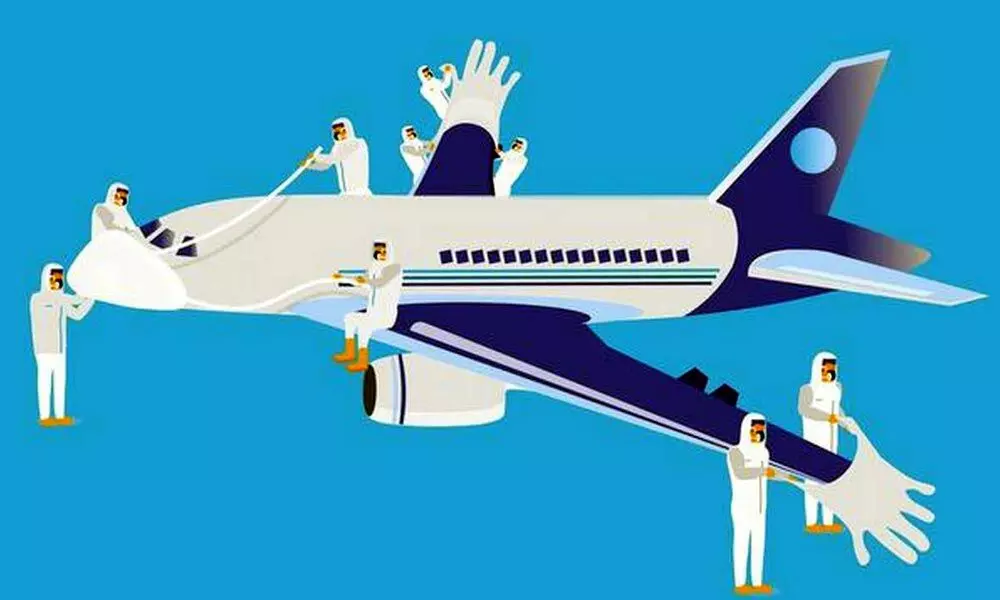Impact of Covid 2nd wave on aviation industry
IATA recommends that governments lay out reopening plans that airlines can reference, that health passports become widely used and global standards regarding vaccination records are adopted
image for illustrative purpose

The carriers will burn between $75 and $95 billion this year as new Covid-19 variants contribute to tightened travel restrictions ahead of the peak northern summer travel season: IATA
AIRLINES will not be cash positive by Q4 this year, according to a revised assessment from IATA. The association predicts carriers will burn between $75 and $95 billion this year as new Covid-19 variants contribute to tightened travel restrictions ahead of the peak northern summer travel season. IATA recommends that governments lay out reopening plans that airlines can reference, that health passports become widely used and global standards regarding vaccination records are adopted.
After conducting 4,700 interviews across 11 nations, IATA announced that most people support a balanced approach to virus containment and the ability to travel. As many as 85 per cent of respondents believed that governments should set Covid-19 targets (such as testing capacity or vaccine distribution) to re-open borders, and half said they felt air travel restrictions have gone too far. Quarantines upon arrival also proved to be a deal-breaker for would-be travellers.
The ICAO Council approved six new Covid-19 recommendations, and amended two others, as countries continue to address latest information and cooperate to optimize the role of international air transport in global pandemic recovery and ensure the speedy resumption of air travel.
The new and amended recommendations and updated guidelines are contained in the High-Level Cover Document and 'Take-off' Guidelines issued by the Council's Aviation Recovery Task Force (CART), established shortly after the pandemic was identified by the World Health Organization (WHO).
Following the emergence of new virus variants, the vaccine rollouts, and other innovations to battle Covid-19, the work of CART has targeted specific issues related to testing and vaccination of passengers as part of a State's multilayer risk management strategy with the ultimate objective of restoring public confidence in air travel and getting passengers to fly again. After the 70 per cent decrease in air traffic, international air transport can now see the light at the end of the tunnel thanks also to these new recommendations and guidelines.
"The Council has also taken into account the latest position of the WHO, which specifies that proof of Covid-19 vaccination should not be made a condition for international travel," he noted.
Specific areas relating to the transport of vaccines on commercial aircraft have been newly addressed by the CART, requiring attention and action on behalf of pharmaceutical manufacturers, airline and airport operators, and national aviation regulators. These include addenda to the ICAO Technical Instructions for the Safe Transport of Dangerous Goods by Air to help better ensure that vaccines are safely handled, transported, and accepted to promote their rapid and effective global distribution.
Travel Pass is a mobile app that will enable travellers to store and manage verified information on their health status, Covid-19 tests and vaccines, in line with any government requirements for testing or vaccine information. The concept of health passports has been around for a while – think Yellow Fever card – but digitising it will lead to more security and efficiency than traditional paper-based processes.
Markets with significant domestic traffic are not expected to recover to pre-Covid-19 levels before 2023 and markets with a significant share of international traffic will recover much more slowly.
Recovery will only be possible, however, if governments can get behind aviation with policy support and assistance to pursue a coordinated and risk-based approach to combining testing and vaccination to promote travel when the epidemiological situation allows.
Airports are spending 5.46 per cent of revenues in 2020 on IT – which represents about $3.5 billion in absolute spend – and that 55 per cent of the responding airports estimate that their 2021 IT budgets will either stay the same or increase.
The survey revealed that 87 per cent of airports confirmed that programs to address passenger health and safety protocols have either been implemented or are planned. These include sensors, video monitoring, and robots to automatically monitor passenger social distancing, temperature checks, sanitization, and other health criteria.
Business intelligence tools, which can be linked to these technologies to help staff maintain a safe airport environment for all customers and staff, ranked third of airport's top investments. Touchless self-service offerings at airports have been an unsurprising investment, with an increasing number of airports having implemented solutions during the pandemic. Biometric technology is the focus for airport investment with 64 per cent of airports aiming to roll out self-boarding gates using biometric and ID documentation by 2023, three times as many as in 2020.
Airports have done so much already to improve the customer experience. The industry cannot afford to lose ground on this progress, despite the challenging environment. This is not just an investment to meet the demand of the pandemic, but in line with a longer-term trend and a solid investment in the future.

